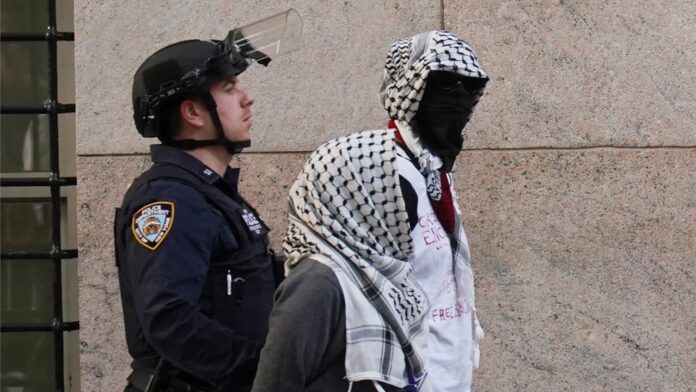Dozens arrested at Columbia University after pro-Palestinian protest against Israel ties
Dozens of pro-Palestinian activists were arrested on May 7, 2025, following a demonstration at Columbia University in New York. The protesters, members of the Columbia University Apartheid Divest group, staged a sit-in at the Butler Library, one of the university’s main buildings, as part of a broader effort to call attention to the institution’s alleged connections with Israel and its “imperialist violence.”
Footage from the protest showed demonstrators standing on tables, chanting, and beating drums, creating a raucous atmosphere within the library. The group declared that they had renamed the library to the “Basel Al-Araj Popular University” in homage to Basel Al-Araj, a Palestinian writer and activist who was killed by Israeli forces in 2017. The protesters argued that Columbia University is complicit in the actions of the Israeli government due to its financial ties with Israeli institutions, thus making it a target for their protests.
In a statement published on Substack, the protest group said, “As long as Columbia funds and profits from imperialist violence, the people will continue to disrupt Columbia’s profits and legitimacy.” They also warned that if the university escalated repression against their actions, they would escalate their protests in return.
However, the protest did not sit well with Columbia University’s administration, which quickly condemned the demonstration. Acting President Claire Shipman called the disruption “completely unacceptable” and emphasised that disruptions to academic activities, particularly during final exam periods, would not be tolerated. In her statement, Shipman also condemned antisemitism and other forms of hate and discrimination, noting that some of the protests involved offensive conduct.
When the demonstrators refused to provide identification or vacate the building, university officials contacted the New York Police Department (NYPD). The NYPD responded swiftly, taking multiple individuals into custody for refusing to comply with verbal warnings to disperse. Around 80 protesters were reportedly arrested, with authorities citing the disruption of academic activities as the primary reason for their actions.
Shipman also noted that two Columbia Public Safety Officers were injured during the protest when demonstrators attempted to force their way into the building. Despite these claims, the university stood firm in its stance, reaffirming its commitment to uphold campus policies, including its opposition to violence and discrimination in any form.
This protest comes amid a broader wave of student activism at U.S. universities, particularly in response to Israel’s actions in Gaza. Last year, protests erupted at over 100 campuses across the U.S., including Columbia, when students voiced their opposition to the Israeli military’s actions during the conflict. The recent actions at Columbia highlight a growing trend of campus unrest surrounding the Israeli-Palestinian conflict, with student groups advocating for divestment from companies involved with the Israeli government.
For the activists, the protest was not just about the university’s direct involvement in the Israeli-Palestinian conflict, but also about drawing attention to the broader issues of imperialism and state violence. Many protesters see institutions like Columbia as symbolic of larger systems that perpetuate injustice and conflict, making the protest not just a local event, but a part of a global movement for Palestinian rights.
The protest at Columbia University is the latest in a series of activist actions that have challenged institutions with financial ties to Israel, calling for broader conversations about ethical investments and university involvement in global conflicts. As of now, the university has not commented further on how it plans to address the growing calls for divestment and greater scrutiny of its ties to Israel.
